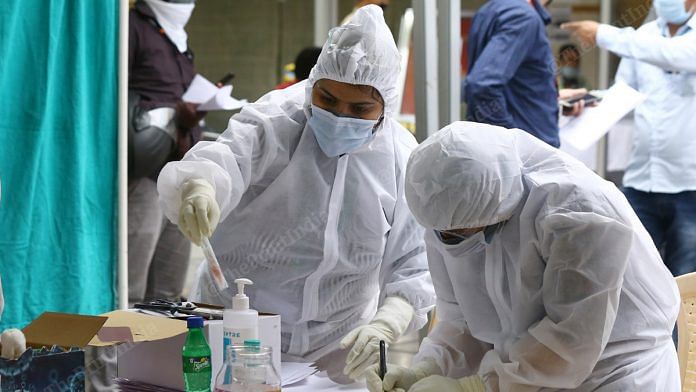
New Delhi: India has noted several mutations in the novel coronavirus since March, out of which one was a super-spreader but it died on its own, said a top official from the Institute of Genomics and Integrative Biology (IGIB).
“Given the number of infections India had, it won’t be surprising that we could be generating several mutants here,” IGIB Director Anurag Aggarwal told ThePrint in an exclusive interview.
IGIB, an institute under the Council of Scientific and Industrial Research (CSIR), has been sequencing the SARS-CoV-2 genes to understand how this new variant will work.
“We have to agree that the UK — which has analysed 5 per cent of all the samples — has generated and analysed the data so well to conclude the presence of mutant virus there. But considering the size of cases here and chances of virus to mutate, India can very well be producing many mutations as well.”
A4 variant
Aggarwal, who is the co-chair at The Lancet and Financial Times Commission on Governing Health Futures, said IGIB noticed “an absolutely unique coronavirus outbreak in India” between March and May.
“The variant was named A4. It started in South East Asia. It was a super-spreading event — which was noticed in samples from states such as Delhi, Hyderabad and Karnataka,” he said.
However, “A4 was not a fit virus as it was heavily mutated and hence, it died on its own by June. It was expected to fizzle out itself, there was no panic and this was not flagged.”
The current sequence, however, is “a fit” sequence and “does seem capable of faster spreading”, he warned, adding that we need to be cautioned but not alarmed.
“According to the UK’s govt data, it (new strain) is capable of spreading 70 per cent more. The correct way is to look at its R0 (R naught). The R value with this mutation increases by as much as 0.7. While the chances of infection increase but it’s not terrible either.”
R0 (basic reproduction number) is an estimate of the number of people a patient can infect.
“However, they (viruses), unlike humans, do not have good quality control in terms of exact replication. Also, they are being pressured by the human body’s immune system so that their RNA is modified and they mutate,” Aggarwal explained.
Kerala has used gene sequencing for detecting the source of the virus. Mutations in the virus occur inside the body of humans. As the virus enters a human body, it replicates in millions.
The mutations can help understand the source of the virus (from where the infection is coming) and sequencing can be used as a tool to fight against Covid.
“I must credit Kerala for its visionary approach which had asked us to sequence a set number of samples in every district to track the epidemic and understand what is the source of Covid infection in their state,” said Aggarwal, who is known for his research in respiratory biology and interests in deployment of emerging technologies towards healthcare.
“They got to know that the virus was coming from across the border states and hence, land traffic needs to be checked. Other states such as Punjab and Tamil Nadu have also discussed such initiatives with us and we are glad to see the use of cutting edge science towards India’s pandemic preparedness.”
India has processed and deposited around 4,300 gene sequencing out of which around 1,500 have been done by the IGIB.
‘Big outbreak in India with UK strain unlikely’
In a country where a large fraction of population has already been infected by SARS-CoV-2 and recovered, the likelihood of an outbreak because of a mutant is not big unless there is an escape from immunity, Aggarwal said.
“India’s curve shows that the country has well passed its peak. Also, the sero survey positivity is high in cities suggesting that a third or more are already in the post-infection recovered phase.”
According to the UK, the virus spreads faster but is not more severe.
“Hence, we need not to be alarmed but remain cautious. There is no need for panic as we already know that the drill remains the same to tackle the infectious virus — which is hand washing, maintaining distance and wearing masks.”
Also, he added, it is not that the mutant has only been found in the UK. Similar mutant virus was also found in Brazil and South Africa.
Vaccines ‘likely to work’ against new mutation
Vaccines in the making, some of which are expected to be launched soon in the market, may remain effective against the new variant, Aggarwal said.
“The mutation, as it looks so far, does not change the neutralising antibodies ability to bind and hence, the vaccines already in the making are likely to work against it.”
Also, people who have developed antibodies against Covid infection may also remain safe against this mutation as the human body generates several kinds of antibodies, he said.
However, synthetic antibody treatments, such as Eli Lilly’s monoclonal antibody drug, are more likely to get affected by these types of mutations.
Subscribe to our channels on YouTube & Telegram
Why news media is in crisis & How you can fix it
India needs free, fair, non-hyphenated and questioning journalism even more as it faces multiple crises.
But the news media is in a crisis of its own. There have been brutal layoffs and pay-cuts. The best of journalism is shrinking, yielding to crude prime-time spectacle.
ThePrint has the finest young reporters, columnists and editors working for it. Sustaining journalism of this quality needs smart and thinking people like you to pay for it. Whether you live in India or overseas, you can do it here.